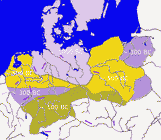German expansion,
when it came, started by a movement to the east but soon developed pressure
on the Celtic speakers behind the Teutoburger Wald and Harz barriers. By the eighth
century BCE the Germans had reached the confluence of the Rhine with the Ruhr.
In the seventh they occupied the region between the Ems and the Ijssel and
both banks of the Rhine below the Ruhr.  In the late sixth century the Maas was
crossed and settlements made in southern Holland and eastern Belgium. To the
south, the Ardennes and the Eifel were reached on the west bank of the Rhine
and the Westerwald on the east bank.
In the late sixth century the Maas was
crossed and settlements made in southern Holland and eastern Belgium. To the
south, the Ardennes and the Eifel were reached on the west bank of the Rhine
and the Westerwald on the east bank.
Further advance was blocked by a line of Celtic hill forts in the Westerwald later extended to the Taunus and, on the west bank of the Rhine, along the ridge of the Hunsrück. Somewhat later, in French Lorraine, a line of fourteen forts was placed to protect the upper Mosel. This line held for two centuries.
German expansion had already displaced a large number of Celtic speaking peoples and it is at this time that the Celtic language was spread to north western Spain. There may have been a new influx of Gaulish speakers in southern Britain. By the middle of the first century BCE the Mediterranean civilisations were just beginning to form a picture of the lands and people north and east of Gallia.In the century before his arrival on the Rhine, German tribes had breached the forest and mountain barrier in central Germany defended by Celtic tribes for two hundred years. This placed German settlements astride the Main and over the Rhine into what is now southern Holland and eastern Belgium. Although Caesar was successful in throwing back the tribes that had taken lands in the Pfalz and Alsace, he obviously allowed the Vangiones, Nemetes and the Triboci to remain on the west-bank lands we find them occupying in the account of Tacitus.
In the low countries and in Belgic Gaul, the Eburones, Atuatauci, Condrassi, Batavi, Treveri, Nervii and several smaller groups were either Germanic or claimed a strong admixture of German blood. German penetration into the Rhine-Main area caused the Helvetii to evacuate Hessen and Baden-Württemburg and withdraw to their tribal lands in Switzerland leaving the regions to the north sparsely populated in Caesar's time.